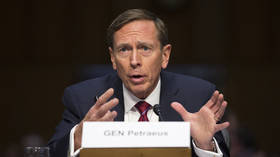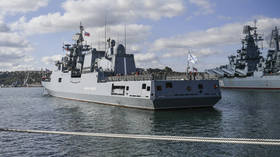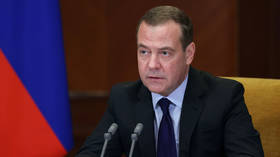Ex-CIA chief outlines potential US response if Russia uses nukes

Retired US Army General David Petraeus has predicted that Washington would lead a devastating response to any Russian nuclear attack in Ukraine, wiping out all of Moscow’s forces and military bases in the region.
Patraeus, who briefly served as the CIA director after his counterinsurgency strategy failed in Afghanistan, told an ABC News interview on Sunday “We would respond by leading a NATO, a collective effort, that would take out every Russian conventional force that we can see and identify on the battlefield in Ukraine and also in Crimea and every ship in the Black Sea.”
The retired general did not offer any specifics on how NATO forces would make easy work of the Russian military, and admitted he was speaking hypothetically and was not aware of the Biden Administration's plans. Patraeus added that Washington should avoid a “nuclear-for-nuclear” exchange, “but you have to show that this cannot be accepted in any way.”
In such a scenario, the US would be going to war directly with the world’s largest nuclear power, as President Vladimir Putin warned last month that Moscow would use all available means to protect Russia and its people if the country’s territorial integrity is in danger. The White House interpreted it as a threat to use nukes against Ukraine, and responded by threatening “catastrophic consequences.”
The retired general claimed that last week’s referendums in the Donbass republics and the regions of Kherson and Zaporozhye, which declared independence and voted overwhelmingly to join Russia, were a “desperate” move by Putin amid losses on the battlefield.
“He is losing, and the battlefield reality he faces is, I think, irreversible,” Petraeus said. He added there was “no amount of shambolic mobilization, which is the only way to describe it, no amount of annexation, no amount of even veiled nuclear threats, can actually get him out of this particular situation.”
Petraeus' predictions follow similarly bold comments last month by retired US Army General Ben Hodges, who oversaw US forces in Europe from 2014 to 2018. Hodges also claimed that Washington could respond to a nuclear strike against Ukraine by wiping out Russian bases in Crimea or destroying Moscow’s Black Sea Fleet.
Former Russian President Dmitry Medvedev said at the time that Moscow will use any weapons it sees fit to use in order to defend its people. Without naming names, Medvedev cautioned that “retired idiots with generals’ stripes” should not attempt to intimidate Moscow by claiming that NATO could attack Crimea.
“Hypersonic [missiles] are sure to hit targets in Europe and the US much faster,” Medvedev warned, adding that “the Western establishment and NATO citizens need to understand that Russia has chosen its own path” and there is “no way back.”
Petraeus said Putin is trying to intimidate European nations into dropping their support for Ukraine. “I don’t think he’s going to out-suffer Europe. Europe’s going to have a tough winter… but they’ll get through it, and I don’t think they’ll crack on the issue of support for Ukraine.”
Petraeus commanded US forces in Afghanistan from 2010 to 2011, presiding over America’s highest death tolls during the 20-year war and increased civilian casualties. The general helped persuade then-President Barack Obama to deploy an additional 30,000 US troops to the country, but his counterinsurgency plan, which hinged on “securing and serving” the local population, flopped. He then became CIA director in 2011, only to resign the following year after having an extramarital affair with the woman who was writing his biography.














